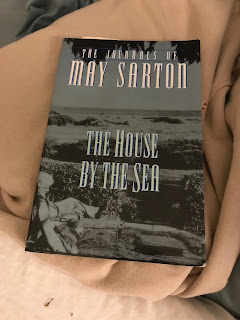P4 “...one moment we are pottering about our errands as usual and the next we are dying, and our eternally impending ending does not put a stop to our transient beginnings and middles until the instant when it does.”
P11 war escalates time (in this example due to the deteriorating of a bldg’s facade)
P 28 Ironic that Sadeed uses a burqa to sneak into Nadia’s apartment to date. When everything is hidden, everything is hidden…
P42: virtual world that is available to people in undeveloped nations stands in stark contrast to their own reality: “...children who went to sleep unfed but could see on some small screen people in foreign lands preparing and consuming and even conducting food fights with feasts of such opulence that the very fact of their existence boggled the mind.”
pp46-47 description of psychodelic mushrooms on consciousness
pp87-88 I like the idea of the exit doors...desperate people searching for a way out, but the theme is embedded in a somewhat clunky, jarring manner. I liked it better when he just used the vignettes instead of explaining anything. It is an interesting concept though, that you could just step through a door anywhere and get somewhere else, especially given how difficult it is to enter and exit some countries now. Maybe he’s making a point about the pointlessness of all the borders and patrols and “safeguards?”
P94 Nadia is more comfortable with change and progress and variations of movement in her life than Saeed, in whom “the impulse of nostalgia” was stronger, perhaps because his childhood had been more idyllic? Same idea as people who have more fearing loss more
P96 parents have to let go of children in order to save them
P98 “...for when we migrate, we murder from our lives those we leave behind…” so many people here for instance not being able to see their parents any more…
P106 Doors west are heavily guarded; doors east are not
P109 “ ...the militants had perhaps hoped to provoke a reaction against migrants from their own part of the world...and if that had been their hope then they had succeeded”
[Violence as a vicious cycle: Militants kill citizens and in return “nativist provocateurs” attack anyone who looks like the militants. What’s the difference in these two violent groups? Any violence: physical, verbal, mental, emotional, is equally wrong. People’s motives are easier to grasp: revenge or maybe just sadism, but regardless of motive, violence is wrong. And I know we think smugly to ourselves that we would never, but we do. We do every time we lash out at each other, it’s just a matter of degrees. Violence starts with ideas, moves to words, and so on, and violence always breeds violence, so it can never be an answer. I don’t have the answer. I just know it isn’t violence.]
P138: build up to conflict, waiting: “the calm that is called the calm before the storm, but is in reality the foundation of a human life, waiting there for us between the steps of our march to our mortality, when we are compelled to pause and not act but be.”
P139: “people are monkeys who have forgotten that they are monkeys, and so have lost respect for what they are born of, for the natural world around them…”
P140: If Nadia broke her promise to keep Saeed safe, would that “mean she stood for nothing whatsoever.”
[The areas where the refugees have squatted become known as “Dark London” because of power cuts and also I assume due to skin color?]
Pp146-7: Refugees under threat retreat into factions of their own kind: safety in numbers, comfort in sameness
[This story makes me grateful for everyday things like the ability to shower and wash clothes and to work and earn an income, for blankets and soap and towels…]
P158: everyone both converging and diverging...the migration, mixing and unsettling and so, frightening...people become isolationist (see Brexti and MAGA)
“The news in those days was full of war and migrants and nativists, and it was full of fracturing too, of regions pulling away from nations, and cities pulling away from hinterlands, and it seemed that as everyone was coming together everyone was also moving apart.”
P 159: “The fury of those nativist advocating wholesale slaughter...so much like the fury of the militants in her own city. She wondered whether she and Saeed had done anything by moving, whether the faces and the buildings had changed but the basic reality of their predicament had not.”
...but then she grasps her freedom outside her homeland and grins “with a wildness.”
[Interesting that the Londoners are referred to as “Natives,” which usually connotes “uncivilized” peoples.]
Pp163-4: “Saeed wondered aloud once again if the natives would really kill them, and Nadia said once again that the natives were so frightened that they could do anything.”
P164 “Our country was poor. We didn’t feel we had as much to lose.”
P165 “...to love is to enter into the inevitability of one day not being able to protect what is most valuable to you”
P197: point of there being no natives left in the USA begs the question...then of where am I a native?
P 209 “We are all migrants through time.”



No comments:
Post a Comment